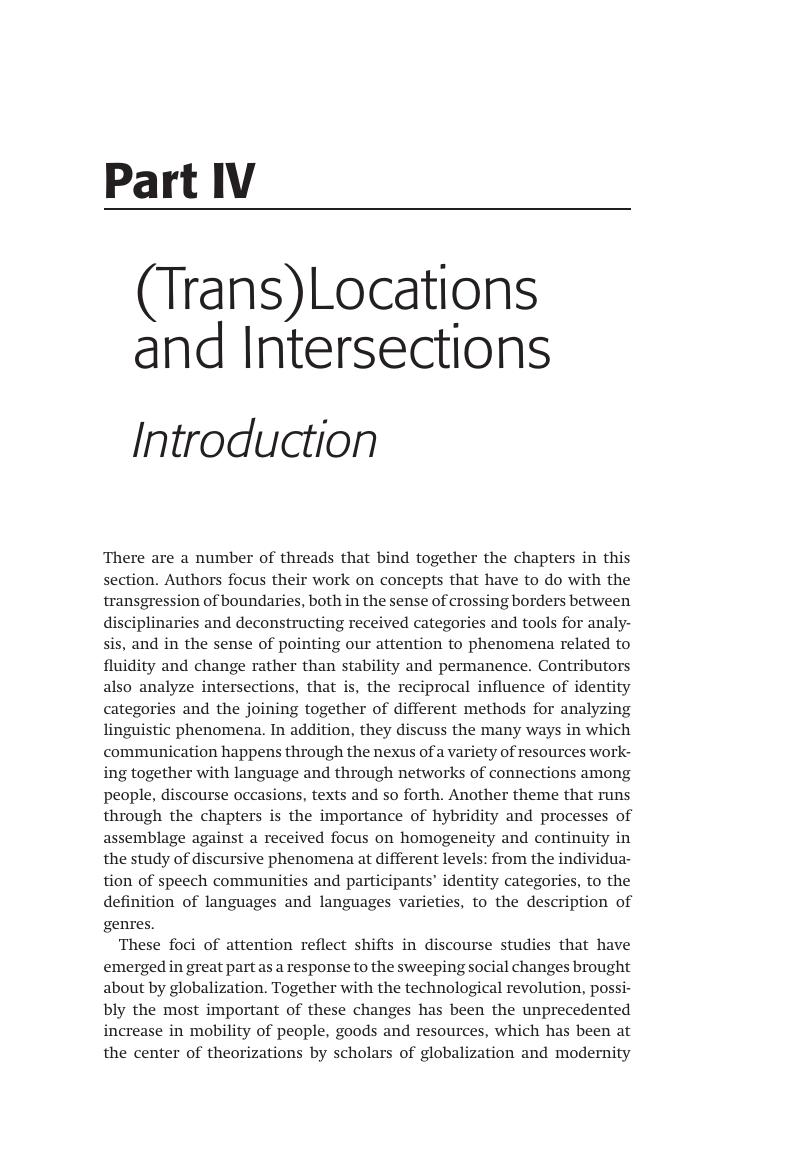Introduction
Published online by Cambridge University Press: 28 September 2020

This provides a comprehensive discussion of contemporary semiotics.
This explores the sociolinguistics of superdiversity, as do the two works that follow (Arnaut et al. 2016; Blommaert and Varis 2015).
For a survey of recent directions and conceptual work being undertaken in the area of language and transnationalism, see this special edition, in particular the article on transnational identity.
This discusses the sociolinguistics of superdiversity.
This deals with the area of language and globalization as it relates to centers and peripheries.
This also explores the sociolinguistics of superdiversity.
This looks at language and globalization relative to centers and peripheries.
This monograph offers an illuminating analysis of the relationships among bilingualism, gender, sexuality, ethnicity and race among Latinx in the United States.
This insightful special issue illustrates how intersectionality can be analytically useful in the study of queer lives in a variety of contexts.
This important edited collection showcases sociolinguistic studies that operationalize the notion of intersectionality with the help of different analytical and methodological techniques.
This useful book summarizes debates about emotions and affect in the social sciences and offers clear examples of the ways in which discourse analysts can go about analyzing emotions in discourse.
This foundational text lays out a critical approach to the teaching of academic discourse, in which academic discourse is understood as a situated, historical, social and ideological practice, rather than a neutral product. Canagarajah examines many aspects of writing pedagogy (e.g. error correction, voice and plagiarism), looking at how teachers can accommodate the linguistic and cultural knowledge of multilingual writers.
This edited volume presents insightful discussions around various alternative forms of discourse that are now present in the academy. The chapters take up related issues including the role of traditionally non-standard discourses, dialects, hybridity and the new conditions engendered by multilingual students in composition courses and in writing across the curriculum.
This book discusses how the conventions of academic genres are formed and how they are creatively flouted. Tardy, an expert on academic genre, here offers insights from her own research on genre innovation, as well as guidance for teachers on incorporating innovation and playfulness into the teaching of academic genres.
This book argues for the value of code-meshing, the blending of African-American language styles with Standard English in academic discourse, as a way of empowering young people of color. The authors address the history of code-meshing, how this technique pushes back against racial segregation and negative stereotypes, and how it can be implemented in education.
To save this book to your Kindle, first ensure [email protected] is added to your Approved Personal Document E-mail List under your Personal Document Settings on the Manage Your Content and Devices page of your Amazon account. Then enter the ‘name’ part of your Kindle email address below. Find out more about saving to your Kindle.
Note you can select to save to either the @free.kindle.com or @kindle.com variations. ‘@free.kindle.com’ emails are free but can only be saved to your device when it is connected to wi-fi. ‘@kindle.com’ emails can be delivered even when you are not connected to wi-fi, but note that service fees apply.
Find out more about the Kindle Personal Document Service.
To save content items to your account, please confirm that you agree to abide by our usage policies. If this is the first time you use this feature, you will be asked to authorise Cambridge Core to connect with your account. Find out more about saving content to Dropbox.
To save content items to your account, please confirm that you agree to abide by our usage policies. If this is the first time you use this feature, you will be asked to authorise Cambridge Core to connect with your account. Find out more about saving content to Google Drive.